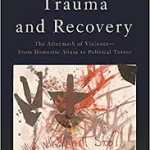 In 1992, Dr. Herman published this groundbreaking book that, over the years, has helped educate countless clinicians who treat traumatized individuals. I believe I came upon this first edition in 1995. The most updated version came out recently in 2015.
In 1992, Dr. Herman published this groundbreaking book that, over the years, has helped educate countless clinicians who treat traumatized individuals. I believe I came upon this first edition in 1995. The most updated version came out recently in 2015.
In my opinion, this book provides one of the clearest and insightful explanations of the many aspects of psychological trauma and is a must for future psychologists and mental health clinicians.
I will give you a small taste of the book by going over chapter 1. In it, she addresses the curious way in which the study (and therefore treatment) of trauma has been repeatedly “discovered” over the years, only to later be buried again. She provides a description of how Charcot and Freud came upon the significance of childhood trauma as a precursor to their patients’ “hysteria” only to later reject and bury it. Although these two men may be the best known for submerging our understanding of trauma, they are not alone. In fact, even nowadays, it is not uncommon that victims of abuse are rebuffed and the veracity of what they are claiming is questioned. Why? Herman goes on to reason that a big part of this is because allowing oneself to hear the traumatic history is distressing and requires action. While, denying and ignoring the traumatized person’s stories, only requires inaction and is a more comfortable position to be in. I don’t do this chapter justice in this brief description, so I encourage you to read it yourself because it is eye-opening.
I also found chapter 2 “Terror,” chapter 5 “Child Abuse” and chapter 6 “A new diagnosis” tremendously useful as a clinician. The second part of the book addresses treatment which is helpful (although there are many books now available that tackle this.
And since this is a blog about psychogenic non-epileptic seizures (PNES), I should mention that the reader will find on page 97, a case of child abuse who as an adult has developed PNES. It is not surprising to run into PNES in a book about psychological trauma since we know that approximately 75-90% of patients diagnosed with this condition also report a history of trauma.
So, if you are a clinician who is working with or plans to work with traumatized populations, this is a great resource to tap into early on. You will likely be returning to it more than once over the years. And if you are a patient, you should know that I have sometimes recommended reading parts of this book to patients and loved ones.
You can find the book here: https://www.amazon.com/Trauma-Recovery-Aftermath-Violence-Political/dp/0465087302


An insightful recommendation! Trauma and Recovery offers a powerful understanding of domestic abuse trauma and healing. Judith Herman’s work is truly essential for those exploring recovery and resilience. Thank you for sharing this gem!